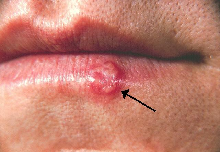(advertisement)
 Herpes is possibly the most common and widespread medical conditions to affect humans. Herpes is a viral disease and most commonly affects the mouth (oral herpes) and the genitals (genital herpes). Herpes is caused by one of types of the virus – herpes simplex viruses type 1 (HSV-1) or type 2 (HSV-2).
Herpes is possibly the most common and widespread medical conditions to affect humans. Herpes is a viral disease and most commonly affects the mouth (oral herpes) and the genitals (genital herpes). Herpes is caused by one of types of the virus – herpes simplex viruses type 1 (HSV-1) or type 2 (HSV-2).
Oral herpes are often called “cold sores”, probably because they tend to manifest during colder weather when the immune system may be weakened as it is fighting off other infections and viruses.
Herpes is an unusual virus in that while it is never completely eradicated by the body it does go into submission for lengthy periods. Herpes follows a cycle of periods of activity and inactivity. When active it presents as blisters which contain the infection. These blisters can remain for 2 to 21 days before they go into remission. When in remission there is no sign of the disease and it cannot be transmitted.
Genital herpes is often asymptomatic, which means that a person may carry the disease and be able to pass the infection on, but they do not themselves develop the symptoms of the disease. This is one of the reasons why herpes is so common – people who practice unsafe sex pass it on without realising that they have the infection.
(advertisement)
Generally herpes is more of a nuisance than an illness. Rarely people do become unwell as a result, especially with the initial infection, but in many people the virus becomes completely dormant
Why Is Herpes Hard to Beat?
The herpes virus infects the sensory nerves and so infects a large part of the nervous system. The virus becomes latent once it settles deep in the sensory nerve endings and the exact reason for a re-occurrence is unknown.
However, what is known is that the virus is never truly beaten by the human immune system. In time the latent virus starts to multiply and then spread along the nervous system by the connective axon cells. One the virus reaches the skin it is then released by the body, and this is when the infection shows.
Herpes is transmitted either by direct contact with a blister or by body fluids. The use of condoms helps to prevent the spread of genital herpes but it does not guarantee protection, it simply reduces risk.
In time the severity of outbreaks does become less and they also become less frequent – a sign that they body does start to fight the disease. In the first year of infection outbreaks can be frequent, however, after a few years they do become less frequent.
Diagnosis
Herpes can often be diagnosed by visually by a doctor. Liquid from a blister can also be collected for laboratory analysis. It is possible to diagnose herpes with a blood test, however, this method is rarely used by doctors.
(advertisement)
Prevalence of Herpes
It is estimated that herpes affects somewhere between 65% and 90% of all humans (Chayavichitsilp et al, 2009). As a person grows older they are more likely to develop herpes.
In the USA, HSV1 affects around 26.3% of 6-7 year olds and around 36% of 12-13 year olds. One an American reaches 70 years of age they have a 90% chance of herpes infection.
Around 10% of people have genital herpes. Herpes is a very common condition.
It is estimated that 1 in 4 people with herpes are not aware that they have it.
Treatment
While there is no cure at present, antivirals do help you to manage to infection and can reduce the severity of outbreaks. There are now several antivirals that can be used to treat herpes. TGwo effective treatments against herpes labialis (oral herpes) are aciclovir (sold under the names Cyclovir, Herpex, Acivir, Acivirax, Zovirax, and Xovir) and valaciclovir (often sold under the names Valtrex and Zelitrex).
There are a few topical creams for the treatment of oral herpes; acyclovir, penciclovir, and docosanol.
Herbal Remedies?
While you may be able to find several products (especially online) that purport to treat herpes, there is currently no scientific evidence that any herbal or alternative medicine is effective in its treatment. Popular alternative treatments include echinacea, eleuthero, L-lysine, zinc, bee products and aloe vera. It is best to avoid these and try to obtain an antiviral from your doctor.
Prevention
There is no effective way to prevent catching herpes. Unless you are prepared to stop all physical contact with other people, you will always be at risk of catching it. Maintaining a healthy lifestyle and diet helps to keep the immune system strong which can help to keep it at bay.
Further Reading
- NHS Choices – Genital herpes
- Genital Herpes – CDC Fact Sheet
- Genital herpes BBC advice
- Herpes Simplex – Medicine Plus
- Chayavichitsilp P, Buckwalter JV, Krakowski AC, Friedlander SF (April 2009). “Herpes simplex”. Pediatr Rev 30 (4): 119–29; quiz 130. doi:10.1542/pir.30-4-119. PMID 19339385.
(advertisement)

